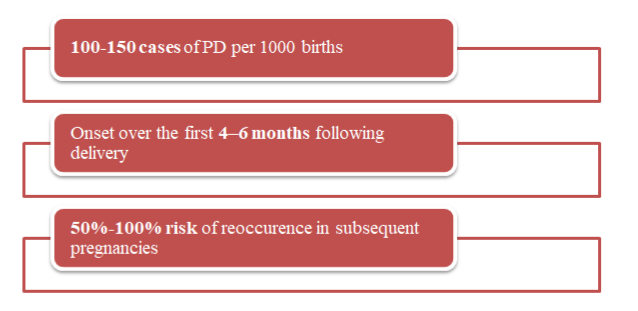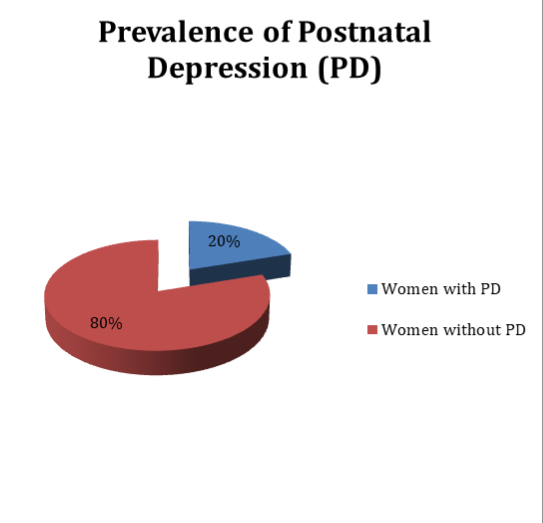Introduction
One of the most prevalent mental health issues that have significant adverse implications is postnatal depression. Community-based health promotion practices based on relevant theories, approaches, models, and methods constitute a powerful tool aimed at managing this problem. This presentation will cover the reflection on the health promotion aimed at postnatal depression prevention and treatment in Mental Health UK.
Postnatal Depression Statistics Overview

The prevalence of postnatal depression is high in the world and requires professional attendance. Indeed, the World Health Organization indicates that “global occurrence of postpartum depression has been estimated as 100–150 per 1000 births” (Jaya Salengia et al., 2019, p. 438). This mental health issue is detected on average in 10–20% of mothers within the first 4–6 months after delivery (Jaya Salengia et al., 2019). Furthermore, the conditions is highly likely to reoccur (the likelihood is estimated at 50-100%) in subsequent pregnancies (Jaya Salengia et al., 2019).

The symptoms of postnatal depression include “loss of energy and appetite, insomnia, social withdrawal, irritability, and even suicidal attitude” (Jaya Salengia et al., 2019, p. 438). Such conditions have significant adverse outcomes for infants, which is why health promotion and prevention practices are essential.
Organization and Project Description
The organization in which the health promotion practices were observed is the postnatal depression department at Mental Health UK, the Barking Community Hospital. It is a well-developed, professional, and experienced charity organization specializing in mental health issues (“About us,” n. d.). The organization delivers local services and as a nation-wide expertise in helping people with mental health problems to ensure that people impacted with mental illness have proper support and means to heal (“About us,” n. d.). The project is the postnatal depression services, which includes an array of practices aimed at supporting individuals impacted by depressive disorders after giving birth, which is an essential concern in women’s health (Mahdi et al., 2019). This project involves charitable events’ arrangement, support groups, educational interventions, and awareness-raising campaigns.
Health Promotion Model
The Health Belief Model of health promotion is used by Mental Health UK in the course of implementing its postnatal depression project. This model implies interventions aimed at changing the perception of a health issue, instiling understanding of its causes and risks, encouraging actions to avoid risks, and increasing self-efficacy for managing the issue (Green et al., 2020; Wells & Aronson, 2021). Using the model, the organization incorporates informational, community-based, group, and partnership work to ensure that postnatal depression is perceived as a disorder that can be successfully handled.
Social Change Approach
Mental Health UK uses the social change approach to change the perception of postnatal depression in the community of young mothers and beyond to eliminate stigmatization, discrimination, and underdiagnosis. In particular, Mental Health UK facilitates the development of organizational policies aimed at screening of patients for postnatal depression
Education Approach
The educational approach is used to teach the community about postnatal depression, its causes, manifestations, and the ways of its management and treatment (“What we’ve achieved,” n. d.). Mental Health UK compiles leaflets and posters, aimed at increasing patients’ awareness and understanding of postnatal depression threats. In addition, Mental Health UK partners with other organizations like Barking Community Hospital to disseminate the educational health information on postnatal depression (“Depression,” n. d.).
Empowerment Approach
The empowerment approach implies “building public support for changes in public policy” (Nutbeam, 2019, p. 706). The organization’s project effectively implements this approach by raising awareness about the issue and establishing strong partnerships. Mental Health UK combines “experience to improve life for anyone affected by mental illness.” (“Our founding charities,” n. d., para. 1).
Role and Skills Reflection
Within this project, I performed the role of a volunteer community worker, which implied the responsibilities of assisting in compiling and disseminating information, communicating with the served individuals in support groups, and engaging in organizational work. To perform effectively in this role, I had to demonstrate a high level of empathy, which is essential in community work and mental health promotion (McKenzie et al., 2022). Furthermore, I practiced active listening skills to be an effective interlocutor capable of assisting in relevant decision-making. At times, leadership skills were required due to the necessity of handling challenging decisions (McKenzie et al., 2022). Critical thinking was essential in performing effectively in the team of community workers. Overall, my level of these skills’ development was sufficient, although I will need to work on multitasking, time management, and communication strategies to perfect my competencies in the future.
Project Strengths and Weaknesses
The strengths of the project include its relevance and the professionalism in handling the mental health issue in the community. The development of a network of partnering facilities, and well-aligned use of methods and techniques of health promotion are the strong features. As for the weaknesses, one should state that the outreach of the project was relatively limited and might have impacted more people. The organization predominantly uses one model, the health belief model, which partially limits the opportunities for better health promotion. Similarly, another weak feature is the insufficient measurability of the impact of the project, which might have been better documented by the organization.
Recommendations and Conclusion
In summation, Mental Health UK has devoted its efforts to postnatal depression as a pivotal mental health issue. It used relevant models and approaches, as well as implemented proper methods and techniques to achieve high results of its performance. The work with the community and partners was effective in terms of facilitated empowerment, education, and social change. Overall, it is recommended to diversify models by adding the transtheoretical model to facilitate the effectiveness of response to critical cases. The use of media for better community outreach and engagement and the implementation of quantitative measurements and documentation to improve impact evaluation are recommended.
References
About us. (n. d.). Web.
Depression. (n. d.). Web.
Green, E. C., Murphy, E. M., & Gryboski, K. (2020). The health belief model. In The Wiley encyclopedia of health psychology (pp. 211-214).
Jaya Salengia, B., Rajeswari, S., & Nalini, S. (2019). The relationship between maternal confidence, infant temperament, and postpartum depression. Iranian Journal of Nursing and Midwifery Research, 24(6), 437-443.
Mahdi, A., Dembinsky, M., Bristow, K., & Slade, P. (2019). Approaches to the prevention of postnatal depression and anxiety–a review of the literature. Journal of Psychosomatic Obstetrics & Gynecology, 40(4), 250-263.
McKenzie, J. F., Neiger, B. L., & Thackeray, R. (2022). Planning, implementing and evaluating health promotion programs. Jones & Bartlett Learning.
Nutbeam, D. (2019). Health education and health promotion revisited. Health Education Journal, 78(6), 705-709.
Our founding charities. (n. d.). Web.
Stellefson, M., Paige, S. R., Chaney, B. H., & Chaney, J. D. (2020). Evolving role of social media in health promotion: Updated responsibilities for health education specialists. International Journal of Environmental Research and Public Health, 17(4), 1-7.
Tan, H. M. J., Tan, M. S., Chang, Z. Y., Tan, K. T., Ee, G. L. A., Ng, C. C. D., Hwang, Y. K. W., Koh, Y. L. E., Low, Y. P. S., & Tan, N. C. (2021). The impact of COVID-19 pandemic on the health-seeking behaviour of an Asian population with acute respiratory infections in a densely populated community. BMC Public Health, 21(1), 1-10.
Wells, M. B., & Aronson, O. (2021). Paternal postnatal depression and received midwife, child health nurse, and maternal support: A cross-sectional analysis of primiparous and multiparous fathers. Journal of Affective Disorders, 280, 127-135.
What we’ve achieved. (n. d.) Web.